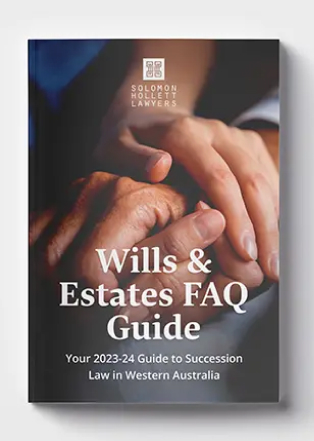As succession law experts, we work with clients every day helping defend estates from challengers when a loved one dies.
We know this is a stressful and difficult time – just when you should be grieving and dealing with the unfortunate realities of a loved one passing on, you may find yourself having to defend the estate from someone looking to contest it.
Having the right legal representation and the right strategies employed from the get-go can see conflict resolved quickly with far less impact on you both emotionally and financially.
Defending your inheritance – what’s the process?
When it comes to defending a Will, our job is to help clients defend their valid position as beneficiary when others come out of the woodwork with claims we see as having no or very little merit. It is important to remember that merely being a child, or grandchild, or partner of a deceased person in and of itself does not mean they have a claim – and we spend a great deal of time analysing the claim and the defence to get you in the best position to defend it.
Step 1 – Get the right advice as early as possible
We encourage clients to get legal advice as early as they possibly can when they suspect a claim might be coming. This means getting in touch and taking advantage of our free 15-minute consultation we offer for all new matters.
Sometimes you can detect a claim may be coming even before the Will maker has died – sometimes they have been brewing for years and no one is surprised when they happen. Sometimes they are a complete surprise and a great shock.
Often there are strategies that can be employed very early on to either minimise the damage or even put the claim to bed before legal proceedings start. This saves not just money, but the sleepless nights as well and means the distributions aren’t tied up and frozen for months and possibly years, which is what invariably happens when a claim is formally made.
Step 2 – Fact find and strategy development
We’ll make an appointment with you to start to gather the deeper information we will need, including any information you have and information yet to hand or harder to obtain. We analyse each situation as every person, every claim and every family is different with unique circumstances and dynamics to take into account.
We work out the weaknesses of the claim being made and the strengths to your defence and how best to underpin it. Our estate litigation lawyers weigh up the financial landscape of the beneficiaries and claimant/s and the overall value of the estate to help bolster your defence, and during this stage we outline the expected timeline, costs and anticipated outcomes.
Step 3 – Employ smart strategies to look to resolve
We work with our clients and try and negotiate a sensible resolution as early as possible to keep the matter from blowing up in Court. We believe strongly in making sensible offers of settlement early, which, when taking into account the future anticipated legal costs, almost always works out better financially for all parties.
We have a host of strategies and tools we can employ here to negotiate and have a sensible and civilised dialogue with the other side to look to negotiate before any Court proceedings need to begin. These strategies are so important to stave off a change to or limit the damage of a successful challenge from the other side.
Step 4 – Filing an appearance
As a defendant, you will be a beneficiary of a Will and stand to gain from the estate of the deceased, and you want to keep what you are rightfully left in the Will. When early strategies to negotiate do not resolve, your next step in Court is to file what is known as an appearance. This is a short document that simply indicates to the Court that you intend to defend – it does not set out anything at all about why you are defending or the strengths and weakness of the matter at hand – that comes later.
Step 5 – Case management and mediation
Once your appearance has been filed, and once the appearances of all the other defendants are filed, the Court then writes to all the parties’ lawyers and invites them to what is know as a case management conference. This is a Court hearing where the lawyers work out with a Court registrar the programming of the matter to push it forward to a mediation.
Sometimes these are complex, where there are lots of defendants or lots of claimants, and there are underage beneficiaries or claimants who need guardians to be appointed for example, but more often than not, it is a relatively straightforward matter for the lawyers to agree for the matter to go to mediation. Unlike a commercial legal matter, where both a claim and a defence are filed in detail before the parties can move forward, family provision claims are programmed differently, and you do not file an actual defence before mediation.
That means at mediation only one side of the story is in evidence, by affidavit of the claimant – your defence is not yet known to the claimant at this point and is raised at the mediation itself.
Step 6 – Moving to trial
If mediation is unsuccessful the matter goes back to a registrar for further programming and eventually to trial before a judge to make a decision on the merits of the claim – trials can last as little as one day to several weeks, with months in the preparation and planning.
Trials can involve many witnesses and a vast amount of evidence, especially when arguments around financial contributions to properties, or whether someone is or is not a defacto spouse needs to be tested.
Once a trial is finished, the judge will make their decision and hand it down in writing. Appeals can occur post this stage but are quite rare.
Where a matter is particularly unique it may need an appeal, which is whether the matter is taken up to other judges in the Supreme Court – not a fresh trial, more a hearing on a point of law that is deemed worthy of review.
Step 7 – Late stage settlement
There is always the ability to settle and resolve a matter at any stage – even on the steps of the courthouse as a trial commences, and it’s not unusual for parties to reach a settlement when faced with surprise evidence that can seriously damage their position. Our aim will be to get you to settlement as quickly and painlessly as possible if the circumstances arise that make it financially viable.
We can guide you through the process
Defending your inheritance from a Will challenge can be a complex and emotionally draining process. By seeking the legal advice and representation from our experienced Perth lawyers, you can navigate this difficult time more effectively.
Our experienced team is dedicated to helping clients protect their rightful inheritance, employing smart strategies and guiding them through every step of the process.
Remember that it’s essential to act quickly, gather relevant information, and keep an open mind to potential settlements throughout the journey. By staying informed and proactive, you can minimise the impact on your emotional and financial well-being while ensuring the intentions of the deceased are upheld.
Please note the content within these blog posts is not intended to, and does not in fact, constitute legal advice, and must be treated as a general guide only. The content is based on Western Australian law only and is subject to change, is general and may not take into account your particular circumstances. Should you require legal advice in relation to your specific circumstances, please reach out.









